Alice Cooper Group bassist DENNIS DUNAWAY gives LRI a massive, career spanning interview
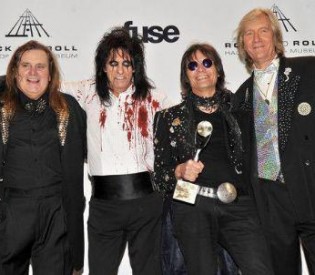
Dennis Dunaway was described to me as “the dark force” of the original Alice Cooper Group by his longtime bandmate, drummer Neal Smith. If you REALLY think about it, that says a helluva lot considering the overall creepy, sinister and yes, legendary nature of the original five band members. Since Dennis was the driving force and songwriter behind tunes like “Black JuJu” and “Dead Babies” it’s easy to come to that conclusion. I was thrilled to talk to the man himself and came away with lots and lots of tape of our conversation and one of the most in-depth interviews we have ever conducted. I found the 2012 Dennis Dunaway to be incredibly kind, intelligent and down to earth as we discussed his infamous past, his current project Blue Coupe (featuring members of Blue Oyster Cult and Alice Cooper), his family and much more. Read on… (Both Dennis and Neal’s interviews are dedicated to the memory of their fellow Hall of Famer and guitarist Glen Buxton, R.I.P. Glen)
Photos courtesy of www.Dennisdunaway.com
Legendary Rock Interviews: It’s an honor to be talking to you Dennis. I had to laugh when you told me that you and Alice were both students in journalism class together so I better use spellcheck. And then I got nervous (laughs).
Dennis Dunaway: (laughs). Yeah, we were both on the school newspaper together and were interested in all of those types of things. I was just kidding though. For some reason back in 1964 those journalism classes were considered something that was for girls. I was getting all kinds of flack for it until everyone realized that we were IN THE ROOM WITH ALL THE GIRLS IN IT (laughs). Then everyone started signing up, Alice followed in my footsteps, I was the sports editor and then he became the sports editor. Now, when I read newspapers and things I find myself thinking about how they could have adjusted the font in their headlines and things like that (laughs). That kind of stuff sticks with you I guess.
LRI: Your Facebook page “Dunaways Rock” is pretty cool because you really incorporate your whole family, you’re a pretty artistic bunch.
DD: I think most people who are in entertainment have sort of that artistic background that runs through the family tree. My wife has always been a designer and both of my daughters sing and at the time we launched the page they both had projects going so it just made sense. My wife Cindy had a lot to do with the image of the original Alice band and actually many bands. Almost every album we did features her costume and work on it from the first album on with the exception of the sailor suits on MUSCLE OF LOVE. She was a major driving force behind the look and feel of glitter and glam rock.
LRI: Was Cindy involved in the transition that you see when you look at the difference in wardrobe between the very, very early Alice and the later, more evil look you guys incorporated?
DD: That was really a band decision. Back in the PRETTIES FOR YOU days early on it was a situation where Alice would take on many different characters. We basically did a different character for each song. We did a song called “Fields of Regret” that had a darker character. That song and that character was the song that the audiences seemed to react to the most so I told Alice and the guys that I really thought we should be going in that direction. At that time though, I really don’t think any of us, with the exception of Michael Bruce, knew how to take our song ideas and actually have them reproduced the way we envisioned them in our heads. It was kind of like firing a shotgun at a blank sheet of music and seeing what happened. It wasn’t until the EASY ACTION song that we were able to really flesh out that character into a song which was “Lay Down and Die Goodbye” but even that was just too erratic and unfocused. Then I wrote “Black JuJu” for that character and many of the songs on LOVE IT TO DEATH were sort of designed for that character. We were also just getting better at writing and focusing in general. We decided that we were going to have Alice become sort of our “Frankenstein” and be that character full time and have the makeup and show reflect that. Most of the clothing Alice himself started envisioning at that time, Cindy would help though. She’d get the tights and Alice would rip them just so and she found the cape on the LOVE IT TO DEATH cover and Alice sort of draped it like that over his shoulder and things like that. When we started giving Vince/Alice the songs that he could really develop that character with, that’s when it all started to really blossom.
LRI: You and your high school pals wrote rock history your own way and were always outcasts the entire ride to the top and now you’re all together enshrined in the Rock and Roll Hall of Fame. There were times I thought it would never happened or at the very least that history would become revisionist and only induct Alice solo rather than the group. From a fan perspective it’s phenomenal, how does it feel to you now that you’ve had time to soak in it?
DD: It’s definitely a proud thing to be able to look at the mantle and see that trophy there. I have other trophies that I prefer like gold albums because they’re plastic and I can hang them on the wall (laughs) but it really is just validation of what the fans like you have been saying to us all these years John. To me, that’s really the reward of it all.
LRI: This is kind of a shitty question to ask. Does it heal any of the wounds of the past or the disrespect from modern pop media often remembering or viewing Alice as a solo act ?
DD: I think we all managed and dealt with that and healed those wounds on our own years ago. I have had those talks with Alice himself many times and I am speaking for him as well as myself when I say that we are still best friends and have been since we were 14 years old. I just saw him night before last and we just pick right up whenever we’re together. There’s no awkward moments or fill in gaps we are just are right there together and that means the world to both of us. As far as the Alice Cooper Group disrespect, it was just something that had to end. We spent our entire career with knives in our back from the very beginning to the very end. We were just too much for everyone in the scene to handle, too much even for the L.A. rock scene which is saying something. Everyone wanted to bad rap us so I’m used to that. There’s been all kinds of reactions to us getting into the Hall of Fame as well. There’s people who think that it’s Alice’s current touring band that’s been inducted.
LRI: You’ve got to be kidding me?
DD: No, well to be fair, the recent Alice Cooper tour sort of implies that with the No More Mr. Nice Guy title and the setlist consisting of so many of our classic tracks being included. I understand there’s no way to do an Alice Cooper tour without including those classic tracks of course but it does add to that confusion and also the fact that they’re playing Neal’s song “I’ll Bite Your Face Off” and my song “Runaway Train” which is getting airplay. Hopefully we can all work together again because the Welcome 2 My Nightmare sessions and the Hall of Fame thing all turned out to be really special. It was in the wind that we may get inducted every year since we became eligible and then every year since we have been nominated but it was a long time coming. We almost couldn’t take it seriously when people would say “Oh, you guys are going to be nominated this year”. It was like “Yeah, I won’t hold my breath” but it seemed to be getting heavier and heavier in the wind. We planned and did the Christmas Pudding show which is Alice’s benefit for his church out in Phoenix, Arizona. It’s like an 8,000 seat theatre and we played that a few years back as the original band which was nice because there were a lot of other musicians and it was for a really good cause and it always gets a great turnout. We did it again last year and we were very excited about that. When we were recording the Welcome 2 album we found out we were again being nominated and then we were out there rehearsing for that 2010 Christmas Pudding show and it was announced that we were actually getting inducted into the Hall of Fame. They announced that at the show that night and I don’t think I have ever heard such a heartwarming response in my entire life. It was truly amazing but was also of course bittersweet because of Glen. I still don’t think that we have stopped being outcasts though. I remember reading internet postings from people saying that we ruined the Rock and Roll Hall of Fame moment and took the shine off of Alice’s induction and moment of glory and I was like “What???” (laughs). I don’t know, I know I have the statue on my mantle so they can say all they want (laughs). It was a really fun weekend and where did it end? At the bar at the Waldorf Astoria with Glen Buxton’s sister and the guys until they were about ready to kick us out at 5 am. Glen’s sister said something to the effect that it was embarassing that she would have Glen’s award with her in the bar and I said “Are you KIDDING me? Glen would LOVE that!! (laughs).”
LRI: “Runaway Train” is one of my favorite songs on the album was that a song you had been sitting on for a while?
DD: Well, I had done an album previous called “The Dennis Dunaway Project” which was something I did with some amazing musicians and I actually got Ian Hunter to work on it with me if you can believe that, which I can’t (laughs). Alice had me on his radio show, “Nights With Alice Cooper” and played some of my album but that particular tune he fell in love with. Alice really liked the hard driving, agressive bassline so much that he took that structure and wrote new lyrics and melody to the song and that’s how that came to be. The original band, Michael, myself, Neal and Alice worked with Bob Ezrin on three songs for Welcome 2 My Nightmare and it was my song, Neal’s song “I’ll Bite Your Face Off” and my favorite song on the album “When Hell Comes Home” which is Michael Bruce’s song which is the creepiest song on the album. Michael’s original demo was even more demented if you can believe that. Neal says that I have a knack for those demented tunes, let me tell you Michael has a serious knack for that.
LRI: Was it easy to go in the studio the four of you and just pick up as if the decades hadn’t passed?
DD: Well, my main concern going into it was “Oh, it’s not going to SOUND like the Alice Cooper Group with just the four of us because Glen Buxton wasn’t there and is no longer with us. He was there in spirit though. We set up the studio in New York City with his Fender amp next to a grand piano with a vase of red roses and a bottle of Seagram’s 7 so that he would indeed be present in spirit. As soon as I started hearing the tracks and as soon as Neal, Michael and I started playing it was so funny because I realized how crazy I was and I don’t know what I was thinking. I don’t know how we can sound like anyone BUT the Alice Cooper Group even if we tried. That’s just the way we sound. I was very happy with that and very happy with Bob Ezrin’s input because it was just like the old days in that he was wide open to our ideas and had plenty of great ideas of his own. We were able to just kick ideas around and brainstorm to try ideas on the spot and those three songs came together in only TWO days. We did those three songs from scratch in two days and it was very true to the original way of working. The tracks went back to Bob Ezrin’s studio in Nashville with Alice and Bob to continue. Alice was at the studio with us while we were recording there in New York City but mostly as an observer because we were laying down the bed tracks, the basic tracks. I kind of wish we were able to go on with the tracks to Nashville with Bob and Alice where they continued the magic because we used to always be involved in the entire process of creation from start to finish. So we kind of missed that process of seeing it to completion all the way to mastering like we did in the old Alice Cooper Group days. Still, it turned out great and low and behold you know who played a guitar track on my song “Runaway Train”? VINCE GILL!! And man, was it great. So, all these years my dad was asking me when I was gonna play country I could now tell him “You have to shut up about that now dad, Vince Gill is on my song!!” (laughs).
LRI: It’s so nice for us fans of the original group to have you be a part of the album and there’s really no question as to it being the best album of 2011. One of the misconceptions people had of you, Neal and Michael is that you all kind of faded away and were tending to flocks of sheep or gardens all these years when in reality you have all stayed busy in your own way.
DD: The truth is we’ve always been here but we’ve been down in the trenches. The reality is that a booker will call a promoter and want to book my band Blue Coupe in a club and if it’s not Alice they don’t know who it is and have a tendency to lump the original group guys in with all the other musicians Alice has played with over the years. I don’t know how many bassists Alice has had over the years but he’s had Chuck Garric and Kip Winger and you end up having to explain everything and it becomes “Well, Dennis was a part of the original GROUP called Alice Cooper and blah, blah, blah”. The promoters cannot fathom or think of Alice Cooper Group anymore they just think of Alice’s solo career. My new group Blue Coupe with Joe and Albert Bouchard from Blue Oyster Cult and that’s different because they’re a part of a band legacy and name that people can remember and associate as members of. They don’t do the same thing for me.
LRI: That’s so cool that you were able to hook up with those guys, I couldn’t be happier for you, what’s going on for Blue Coupe in 2012?
DD: We have an album that we are working on right now and have an unbelievable amount of material written for, well over thirty songs and we will be playing gigs. We have new Facebook page and all of that internet presence.
LRI: You might not wanna hear this but I’d love to also hear a live album. One of the coolest things that John Corabi of Motley Crue and Bruce Kulick of KISS did was a live album where they really put together the best of their own material with their interpretations of the classic bands they are known for. I’d love to hear you and the guys do that with Blue Coupe.
DD: That’s interesting, I did write a song for the band that was written and intended solely to be recorded live. You know if you set up to record one song you really might as well record the whole set. We have a lot of material to choose from and could do a two and a half hour set as Blue Coupe and still have to leave out a few songs between our new originals, the Alice and B.O.C. stuff. We’re staying busy and have been booked to play in France in April which should be fun and we play as much as our schedules permit. People have a tendency to compare our stuff with the old B.O.C or Alice stuff but that’s another thing which proves that I’m not resting on my laurels. It’s a lot more difficult to produce a Blue Coupe album for us when we’re not dealing with the normal budgets of Alice Cooper or Blue Oyster Cult. We’re really undertaking a lot on our own and on a much smaller budget. I guess my biggest problem is that I’m too into the artistic end and have too many projects in the air at the same time. I still wanna do an album which is basically a complete solo album of mine where I call all the shots but between the Blue Coupe project and the Vampires project with Ritchie Scarlett and the months and months of phone calls and emails after the Hall of Fame, I’ve been pretty busy (laughs).
LRI: You’ve got a little bit of history as far as putting together stage shows on a limited budget. You and Alice had started to introduce theatrics and elements of that in your original high school band right?
DD: The very first gig that the Earwigs did was a Halloween dance in 1965 and we had cobwebs designed and painted pieces of cardboard and things like that. We had a guy dressed up as a ghoul and in makeup and we at that point had no idea there was supposed to be such a thing as a setlist. We would just huddle and decide what song we were going to play next (laughs). While we were doing that the guy dressed up as a ghoul would interact with the audience and move around. So yes, to answer your question John, we started OUT doing theatrics at our very first gig when we learned to play instruments. Then we became the Spiders and really started taking the theatrics even more seriously. It got to the point with the Spiders where we were trying to come up with something new every night and then we started doing multiple sets and trying to incorporate something new in every set. Sometimes it would be makeup, sometimes we’d use toilet paper and trickery to become mummies, one time we found an old cast iron bathtub in the back of a club that we thought looked cool so we put Alice in the front of it pointing like George Washington crossing the Delaware. The rest of us heaved this giant bathtub from the back of the club up to the stage and Alice got out and we did the set before lugging him and the tub backstage again. That thing was heavy and it took us about a week to recover from that (laughs) and of course Alice said his finger was tired from pointing (laughs hard). Theatrics were just natural for us, Alice and I were in art class together we were very into surrealist art like Salvador Dali and pop art and just applied it to our shows. We didn’t even think about the visual part that was second nature and the byproduct of us having fun, we had to think about the music and we worked really hard on the music. It was fun getting up there and doing whatever we wanted or trying whatever we wanted and not being afraid of failing and that had a lot to do with what helped the Alice Cooper Group keep going when everyone seemed to be against us for so long. The other thing I chalk up to that is that Alice and I both ran long distance, anywhere from half a mile to three mile runs and that also I think had something to do with the mentality of the band. When you’re running you have to have that mindset of keep going forward no matter what, not to say the other guys didn’t also have that attitude, they did, but I think that was something Alice and I always carried from our running days. Glen Buxton was there with us at Cortez High School in Arizona, he was the class rebel and photographer and the reason he liked photography was because he could go into the darkroom and light a cigarette. Alice and I kept using Glen as a photographer to take pics of our band and try to weasel our way into the school newspaper, even though we were sports editors our main goal was to generate our own publicity for the band. Glen became our buddy and helped us with that and was also a part of our little rock and roll alliance because we were the kids in school pushing the envelope with our long hair. Glen would touch up the photos before they hit the paper so that it looked like we had short hair and wouldn’t draw attention of the administration. When I say long hair, I mean you weren’t allowed to have your hair go further than your earlobe or you’d be thrown out. Alice got kicked out A LOT after Glen and I went off to college and he was there on his own without us and the alliance was broken (laughs).
LRI: When you started venturing out of Phoenix and playing L.A. was it easy to get to know some of the other bands on the scene like The Doors or Love?
DD: There were separations amongst the bands in L.A. There were the groovy, earthy kind of bands and then there were the more experimental, fringe, leather kind of bands. We became friendly with the Doors but not Buffalo Springfield and bands like that. It was the hippies and the freaks with a distinct line drawn down the middle. Buffalo Springfield was on one end of the spectrum and Frank Zappa and the Mothers of Invention represented the other end. We sort of made fun of all of them and didn’t really fall into any category but we were definitely much closer to the freaks than the hippie bands. The Doors were our buddies. Glen used to go out drinking with Jim Morrison and we all were tight with John and Robbie. I have a great Doors story if you have time.
LRI: I love the Doors and Alice Cooper Group both, go on.
DD: We had a seance during our Halloween party at our house in Topanga Canyon. The girls who used to bring us groceries and help us out included The Doors girlfriends Pam and Peggy, who were great friends of ours and they decided they were going to have a party. We were like “Well, hopefully you’re going to get groceries because we can’t have a party with no food” and they were like “Oh yeah, and we’ll invite The Doors” and we were like “Yeah, o.k.” (laughs). Low and behold people started showing up for our party, first it was Arthur Lee from LOVE, David Crosby, Paul Rothchild, The Doors and all of a sudden our house was full of these cool musicians and music people and we had a seance that night downstairs and it was pretty heavy actually. I was one of the skeptics and so was David Crosby and Arthur Lee so we were standing on the outside of the circle and there was a candle in the middle and creepy shadows dancing on the walls. Jim Morrison was DEEP into it with Michael Bruce, our guitarist, holding one of his hands and Alice holding the other as they were in the circle. The girl who was performing it was someone who we knew but we had no idea she did seances or anything like that. She started freaking out and started REALLY freaking ME out and talking in this almost demonic, Linda Blair voice. We had this hold cut in the ceiling where someone who was upstairs could just hand a beer down to someone who was downstairs (laughs). It all ended during this girl’s freakout with Glen Buxton who had too much to drink that night falling through the hole and crashing in the middle of the circle. It wasn’t planned it was just the craziest thing ever but the timing couldn’t have been more creepy to those of us who saw it. The party was a big success and when it came to be the end of the festivities everyone was leaving and of course The Doors were driving home. We were like “Oh, you DRIVE home to Hollywood?” and they were like “Yeah, doesn’t everyone?” and we were like “No, we walk” and they were like “No way” so we showed them our shoes in the bottom. Jim was always up for adventure so he decided HE was going to walk and it was like 3am by this point (laughs). He then decided he was going to up the ante and as he was going up the hills that wind around Topanga Canyon, up these roads around the beach he decided to heave his boots off over a cliff and walk barefoot all the way home through Beverly Hills and into Hollywood. It was a trek, a long distance trek and a dangerous one at that with cars coming around those corners at night but he did it (laughs). The next day we finally wake up of course and we were like “Hey, that’s great we actually had a party and The Doors came and…wow!” so we got it into our head that we’d go down to The Doors offices and see if there happened to be any record contracts laying around that needed signing (laughs). It’s broad daylight in L.A. and their offices were on Santa Monica Blvd. One of those streets still had those old cable car train tracks where traffic went one way on one street and the other way on the other side of the street and they just never ripped the tracks out. We were standing there at the intersection in front of The Doors office trying to think of what we should say when we walk in and we’re looking straight ahead and suddenly there was a sillouhete in the sun on the railroad tracks of Jim Morrison. He’s still barefoot and he comes up to us and says “Hey guys….I did it” and we’re standing there thinking “This can’t be happening”. He said “All I wanna know is where can I get some boots around here” and we were like “Oh yeah Jim, there’s a Buster Brown right around here that has some cool boots but you have to cut the buckles off”. Jim went off to get the boots and Glen cut the buckles off with his switchblade and then they went to have drinks at this Mexican place which started a whole thing between he and Glen. They would go there all the time, in fact they were there the night before the photo shoot for The Doors WAITING FOR THE SUN album. Jim was totally drunk and realized “Oh no, Oh NO, I forgot I have to be out to the beach before the sun comes up for this photo session and I don’t have anything to wear”. Glen took his sweater off and gave it to him and that’s what Morrison is wearing in that photo.
LRI: You eventually got that record deal but it was through Frank Zappa and not The Doors. What were your expectations when you recorded “PRETTIES FOR YOU”?
DD: We were so green, we really had no idea or anything, Michael Bruce probably knew more than any of us. We had done some recordings as The Spiders and as The Nazz before Alice Cooper Group but nothing extensive. We had a regional hit with our song “Don’t Blow your Mind”. We knew we wanted a record deal and we knew we were going to have to go get it so we just barged into Frank Zappa’s house and set up our equipment outside his bedroom door and started playing. We ended up with a record deal as opposed to getting shot or ending up in jail which could have just as easily have happened (laughs). These stories sound too crazy to be believable in 2012 but the fact is that they actually happened. We went into the studio to record the debut and we had from midnight to dawn and we only had a few nights. Zappa was there but he was sick and had the flu unfortunately. The other guys in the band think he was faking it but I talked to him and I don’t, he was really sick. The second day in the studio he didn’t show up and we were like “Ok, great, we’re stranded” because we were trying to do damage control on these tracks we layed down that really sounded terrible. What happened was Frank had decided that he was going to use our WARMUP that was recorded as the actual tracks for the album. We were like “Ok, we’re warmed up, we’re ready to go” and Frank was like “It’s done!” and we’re like “What’s done? We didn’t even try for takes yet..” and he said “No, we got em, that’s it!!”. We were just blown away because there were mistakes on it and we were still adjusting our dials and sounds. On one song “Living”, I hadn’t even gotten my bass out of the case yet (laughs). We were told, “Oh, it’s okay, we can just fix it in the mix” and at that point Michael Bruce got the impression that we were in trouble. The rest of us didn’t get it. I was all naive and said “Really? That’s cool, you can fix it in the mix?”. These days you could actually do that, but not back then in 1969 and even if you could they certainly weren’t going to pay for us to fix it. It was the rush job to end all rush jobs and I don’t think anything has come close before or since (laughs). It was recorded at Burbank Studios.
LRI: It really sounds like you must have been excited to have a different production team for the second album “EASY ACTION”. Was that process a little smoother?
DD: Yeah, we recorded that at Sunset Studios with David Briggs producing who had worked with Neil Young and people like that who like I said were just a totally different camp than us. David certainly did NOT relate to us but he wasn’t alone because nobody could relate to us in Hollywood, we were kind of like the laughingstock of the town. We were so crazy that people would be afraid to admit it if they even came to see us and if they did come they would just yell insults and leave (laughs). I’m serious, because by that point we were five guys who were dressed in drag and had a girl’s name for the name of our band, it was pretty out there even by late sixties standards. Even in Hollywood we freaked people out which as you may know is HARD to do. When didn’t have street clothes we just had stage clothes and we would get insane looks just for crossing the street.
LRI: How did you wind up moving to Detroit before working on “LOVE IT TO DEATH”?
DD: Well, how that happened was we left Hollywood after we finally conquered it. We opened for Led Zeppelin at the Whisky and we opened for Frank Zappa and The Mothers and played Shrine Auditorium. Suddenly when we got Frank’s seal of approval it was like people woke up and realized they hadn’t given us a chance in L.A. Meanwhile, we were living out of suitcases and playing every dive joint and bar we could and we noticed that the place we kept getting a response as far as bookings and crowds showing up was the midwest. Detroit, Toledo, Chicago and on down and up into Canada too. We were way down in the trenches and doing gig after gig after gig and ANY gig we could get in all actuality. What really surprised us about Detroit was that there were all of these amazing Detroit bands, MC5, Ted Nugent, The Stooges who were ALL very welcoming and kind to us. It really took us aback because we were coming from such a different and competitive environment. It was also cool because almost as soon as we started gigging the MC5 guys started putting shiny fabrics on for outfits and Iggy started wearing his famous silver gloves and pants. They sort of jumped on that visual element of our show.
LRI: Was it easy to deliver the theatrics to a working class Detroit audience?
DD: We had a a pretty dark show by that point with the lighting and the hanging and they bought that stuff in Detroit, we went over amazingly well. That really was a big factor as far as why the audiences and other bands liked us so much. Nobody else was going onstage and hanging their lead singer, come on (laughs). What we got from all of the Detroit bands was the understanding of ENERGY. Their energy level and actually the audience’s was on another level compared to the California bands and crowds. You had to go out there and give them an uncompromising fist in the air and a high level of energy. You could not go out there and slow it down with a set of ballads because with the possible exception of Bob Segar, they would eat you alive. That went all the way back in Detroit to even the Mitch Ryder days. We would switch gears though which was the only reason we could follow the Stooges because Alice and Iggy really had a sort of similar stage prescence. It was near impossible to match the energy of The Stooges who would come out balls to the wall on the first song and just continue that way through the set. What we did was the opposite. We would come out, start slow and have Alice hitting the mic stand with a hammer and have this slow build and droning song “Sun Arise” and build up the uncomfort level before kicking into our rockers. It was the only way. If we had come out and kicked it off with our rockers it would have not worked because The Stooges were so intense. We got away with shifting gears because as Glen Buxton would say, we didn’t do “girls” songs. We didn’t do love songs or ballads so if we did a slow number it had us chopping up a baby doll or heavy, heavy lyrical or visual connotations that allowed us to get away with it. Then when we would do “Black JuJu” or a song like that it tended to stand out more.
LRI: Your life changed after you came to Chicago to record “LOVE IT TO DEATH” with Bob Ezrin. What do you remember about recording those classic tracks and songs like “Black JuJu” or “Is It My Body?”
DD: “Black JuJu” started out with a bass riff that I had written in this really old hotel in Rochester if I remember right. Off of Glen’s room there was a little laundry room with a furnace and hot water heater and I had this little tiny amp that you really shouldn’t play bass through and you definitely shouldn’t play bass loud through but I did and it was REALLY distorted. I wrote that riff sitting on the floor and I took that little metal flap off of the hot water heater so that I could see the fire in there and imagine the inferno because I had this really Edgar Allen Poe vibe in mind. I remember that I had to sit there on the floor and keep playing it over and over and over so that I could remember it when Glen got back to the room from partying. I needed him to help me remember it because I didn’t have a tape machine in our room. I got the music part finished and then we went to Cincinatti and I didn’t have a place to stay and somebody said “Well, there’s this frat house and you can stay there during the summer because school’s out”. I went up there to the attic and it was really, really hot and dirty and there was orange sunlight coming in while I wrote the lyrics up there. Right after that we played the Midsummer Festival in Cincinatti and that show was the very first time the Alice Cooper Group played “Black JuJu”. I talked everyone through the arrangements and we played it right there that night. That should give you an idea of how BOLD and fearless we were. We debuted a song that was just composed and never, ever rehearsed onstage in front of a large crowd that was also BROADCAST on national television. Iggy and the Stooges, Grand Funk Railroad and Mott the Hoople played and it was a really tense show with a lot of confrontation between the audience and the police. The stage was set up on the baseball field behind 2nd base and people were getting beat over the head by the police and it got pretty ugly and the kids were fighting back. They were trying to avoid showing the brawl on TV and it was all going on in front of the stage. The thing that I remember about the LOVE IT TO DEATH sessions was that the first two albums were done so quickly, it was like we booked the studio time and had four days. On the second album EASY ACTION we didn’t even have that much time, we literally were pulled into the studio off the road in order to fulfill some contractual obligation and we just did that on the spot. On LOVE IT TO DEATH we actually had the time to work on the songs and Bob Ezrin came up to Detroit to help us overhaul it and we did all the important things like making sure a guitar line wasn’t a major over the top of a minor. We made sure that the bass notes weren’t conflicting with Neal’s bass drum beats, if he had something really cool in mind we would bring it out and vice versa and I had an idea. That started my playing the bass further up on the neck, I was making sure that my lines weren’t conflicting with his things and it really became something I did a lot of. If you have the bass playing low and the floor drum and bass drums playing low it tends to get muddy and there’s less separation of the sound. The perfect example would come later on the chorus of “School’s Out”. No bass player in the world would play that chorus up high on the neck the would play that in a lower octave but we didn’t NEED the bass down there. It sounded muddy down there and conflicted with Neal’s awesome tom tom part. When he got the floor toms and the bass drum going there was plenty of bottom end and LOVE IT TO DEATH was the beginning of us starting to understand and develop that give and take. One thing that Bob Ezrin also brought was a classical influence and the fact that he would let us basically create and do our own thing until it became clear that we weren’t headed in the right direction. Neal and I were the most disruptive to the process to be honest because Neal would be coming up with these way far out drum parts and I would be way out in outer space with a lot of my bass parts. We would be on opposite ends and doing opposite things but you could always feel the two of us slowly gravitating towards each other as a rhythm section and coming together. I could always tell when we were getting close because it would start to sound like a locomotive was coming through. Bob and the rest of the guys in the band were very patient and very open to letting the two of us find our sound and experiment with our music. Like I said, we were in some respects, very disruptive as a rhythm section (laughs).
LRI: Other artists have painted Bob Ezrin in a much more disciplinarian light.
DD: Well, that may have changed over the years with Bob, some bands may need more of that than others and also Bob was very young when we worked with him. It was his first project and he was basically a KID and he looked even younger than he was (laughs). On the other hand we were a very robust and strong band but also a very strong group of personalities. We were a very tight knit group, very much on the same page, very intimidating and ruthless with our verbal humor. We were a very sarcastic bunch and Glen in particular would cut everybody down to size on a regular basis. That’s the band Ezrin walked into but he was keen enough to realize that it was one of the elements that made our group so much different.
LRI: We know what happened when ” I’m Eighteen” hit here in the states but what was the reaction when you took the show overseas for the first time touring behind LOVE IT TO DEATH?
DD: We thought it was going to be a situation of starting all over. We were used to being the dark horse and being overlooked and we figured that going to Europe we were going to be fighting our way up from the very bottom. What we didn’t realize was the power of our association with Frank Zappa because he was GIGANTIC over there, much more so than here in the United States. America is so chart orientated and hit single driven that Frank and The Mothers were sort of taken for granted here despite their hardcore underground fanbase. In 1973 America if there were a list of top 100 guitarists Frank would not make the list where in Europe he would be in the top 10. We got off the plane and were instant successes but some of that also was due to some accidental genius on the part of our manager Shep Gordon who had us booked to play Wembley Bowl and promoting it. There was this totally random, unintended occurence of a promo truck breaking down in the middle of daytime traffic in Picadilly Square, London which is their Wall Street basically. The truck was a moving billboard of Alice fully nude except for a snake covering his private parts and it was driving all over London advertising the Wembley gig. When it broke down there were helicopters flying over and every single press outlet picked up the story so of course every show at Wembley was sold out (laughs).
LRI: When you came to do the next album KILLER you were a band that was getting a tremendous amount of attention. Did that affect the proceedings?
DD: When PRETTIES FOR YOU and EASY ACTION didn’t meet with success we went into the sessions for LOVE IT TO DEATH and were very skeptical. We figured it was our third strike and we were out, we just assumed that if that album wasn’t a hit we would be out of chances. The environment going into KILLER was totally different because we were all feeling our powers across the board and I think everyone was playing their best as well. We had success were still a band and a gang without all of that outside influence where money starts to make all of your decisions and affect your art. The title track to “KILLER” came to me in a dream. I used to keep a pen and pad next to the bed so that whenever I had a dream and could remember it I could immediately write it down. In my dream I was floating alongside a guy who was on death row and walking to the electric chair. I was floating around like a Marc Chagall character in one of those paintings and hearing his thoughts which became the lyrics, “What did I do to deserve such a thing”. I had written that down and went back to sleep and didnt even really remember it in the morning until I looked at my writing and said “Oh yeah, now I remember the dream”. I knew I had to be careful because I really had the feel and the lyrics and the melody of the song but I didn’t want it to go in the wrong direction. At the end of one of our long, ten hour rehearsals at the barn in Pontiac, Michigan we were all packing up. I said “Michael, stay a minute because I want to play something for you” and he said okay and sat down at the organ which really bugged me because I wanted him to play guitar on it (laughs). I already had a lot of ideas for it and wanted this really sleepy, long story but Michael kind of did what Bob had done to “I’m Eighteen” and whittled it down to what was important to say and left out the excess. The next day he and I showed it to the band. “Dead Babies” came about because we had two different songs. One song that had a great verse and a crappy chorus and another that had a crappy verse and a GREAT chorus. I really didn’t want to lose them or have them fall by the wayside as many, many songs did back in the days when we didn’t have a tape recorder. One of the other things that Bob brought to the table he was he remembered every single thing we did the day before in the studio. Whenever we were rehearsing in the barn in Pontiac and it was decent out we would open these big doors up, it actually WAS a barn where the farmer kept all of his tractors and machinery. There was a prison across the way and they could probably hear us with the doors CLOSED because we were that loud but they definitely heard us with the doors open. When we’d play a song that the prisoners really liked we would hear them cheering. I had an idea that I wanted to use the verse from one song and the chorus from another and I had a bassline that I wanted to use to tie it all together. Everyone was all skeptical, “No, we should just move on” and I was like “No, let’s try this”. We had a rule that you couldn’t shoot down anyone’s idea until we tried it. If the band attempted to play it then they could shoot it down and that would be the end of it and we agreed not to hold any grudges or anything like that. So I started my bassline and we went into the good verse and then we went into the good chorus and when we got done the prisoners all cheered. I was convinced that day that had the guys not cheered then “Dead Babies” would never have happened. It became one of our better known parts of the show because of the theatrics that happened during the set.
LRI: It’s really cool the more you hear about the individual stories you guys all have. So many people have a misconception that the majority of the creative force was Alice himself.
DD: Every song, every show, every theatrical element, every thing we did was the five of us all brainstorming. That’s all we did. We were a conceptualizing and visualizing machine and it was ALL of us, Glen, Neal, Michael, Alice and I. All we did was think of ideas and every one of us would try to top the other ones idea and add to it and so on and so on. That’s just the way it happened and everything we did was along those lines.
LRI: The “SCHOOL’S OUT” album is another undisputed classic but I think the most interesting thing about that album is that it’s for the most part pretty avant garde and complex aside from the hit single. I mean, you’re mixing in Sondheim on “Gutter Cat Vs. The Jets”
DD: I have always, always played these sort of raucous bass things with an open bass string and then played the notes on a G string and that was just simply one of them. Whenever I’d warm up I would always include something like that in my warmup because it’s something I have always done and still do to this day. I will make up a melody like that to loosen up. That one we wanted to incorporate the SCHOOL’S OUT theme and have the Jets versus the Sharks and all of those elements indicating that while “School’s Out” it’s because we’re a bunch of hooligans who had to disrupt the system and do our rebellious thing. The “Gutter Cat” song was basically just a bass line and I wrote it 100% but then I wanted Glen to help me present it to the band because I couldn’t play the part and sing it at the same time so I wanted him to learn the guitar part and get a writers credit. Then we decided to hook it up with the “Jet” song from “West Side Story” so we ended up having to share our credit with Bernstein and Sondheim although I can say that it’s pretty cool to share a credit with those two (laughs). We were writing and recording that whole album while we were out on the road. We would come back to New York, go to the studio and lay down a few songs, go do a few gigs and write another song while we were busy with the gigs and then have to come back and record it. That was the beginning of the period where we not only didn’t get a break but were working triple time.
LRI: The album is interesting in the sequence. It flows and transitions well.
DD: I think that a lot of that goes back to the days when we were playing all those shows as The Spiders. We didn’t always have enough material to cover all the sets we were doing so we would do a Beatles medley or a Kinks medley and we started to get good at coming up with those segues. We would always try and come up with a new set and never play the same thing twice and Michael Bruce in particular was very instrumental for doing those transitional elements like what you’re talking about on “SCHOOL’S OUT”. We would also change those elements up during the Alice Cooper Group live sets just to keep things interesting. If you listen to some of the live gigs you will hear us go from one song to the next with some transitions that were never on the album at all. That’s also the insight to “Halo Of Flies” on the previous album “KILLER”. The song “Halo Of Flies” was a song that was a whole bunch of good riffs and ideas that never developed, we called them “germs”. If you had a “germ” it was an idea that might end up being used in a song. Well, we had so many of those kicking around that we decided “Hey, lets put all the germs together in one song”. When we said that we had no IDEA that the song was going to end up being like 8 minutes long and we wrote it with a chalkboard. It was a case of “Name the Part” and it was like galloping part, Arabian part, etc. We would erase parts and move parts up and down on the chalkboard. “Halo of Flies” was simply a medley of different ideas that we had kicking around and really a great insight in my opinion to the brilliance of Michael Bruce’s insight to putting parts together and making it flow. Anyone can cut and paste a bunch of ideas together but making it flow and transition is another story altogether, that’s not easy, especially when there’s that many parts. I’ll see people play “Halo Of Flies” and they’re very accomplished musicians but let’s hear you WRITE one. Let’s hear you write a song like that….come on (laughs).
LRI: The next album is my all-time favorite “BILLION DOLLAR BABIES”. Maybe it’s the a combination of the songs, the packaging, the concept. It all seems perfect to me and it’s hilarious and insightful that ROLLING STONE gave it a two-star review. They never gave us KISS fans anything to feel good about either.
DD: They were never kind to us ever or even groups like Led Zeppelin for that matter. They just pick what bands they like and have ridden that for years. They have never liked or appreciated bands like KISS or Alice Cooper. I’m rooting for KISS to get into the hall of fame. It’ll happen it’s just a matter of when.
LRI: I wanted to ask you about the genesis of “Elected” and “Generation Landslide” in particular.
DD: Well, “Elected” was one of those things like “I’m Eighteen” or “School’s Out”. They were these anthems, these songs that people could relate to and a song like “School’s Out” was written as another “I’m Eighteen” and it became that. It was one of those songs where every time it got to be that time of year where school was out the song would be given new life and it still does. “Elected” was along those same line but it was really more of an overhaul of the song “Reflected” from our first album. Even in “Reflected” it says, “I wanna be elected”. All we really did was give it a high energy overhaul and anthemize it sort of like Alice did with my song “Runaway Train” for WELCOME 2 MY NIGHTMARE. The great thing about “Generation Landslide” was how it happened to end up on the album We had recorded BILLION DOLLAR BABIES at the mansion in Greenwich and we would do the opposite of most bands where they would do an album and then a tour. We would do an album and then have to come up with a whole gigantic stage production that nobody was doing at the time and we did it on our OWN. We didn’t have someone to come in and design the stage and set design for us we did it all. We went to England and Morgan Studios and worked on some of that while we toured EUROPE and that’s where the famous superjam happened with Henry Nillson and Keith Moon, Marc Bolan and all these others but when before we got back to America we still needed one more song. It was the end of the European tour and we were all sick and tired and we went to the Canary Islands and there was this huge hotel on the beach. We noticed all these bellboys at the hotel all looked like the Phillip Morris guy and they were always asking us what we needed or trying to help. We were like “What room do we stay in?” and they were like “Any room you wish” and we were like “Okay, can we get a key with a room number on it” and they were like “No, you can just go in any room you want” and we came to realize that we were the first people to ever stay at this big hotel (laughs). We went up to the roof of the place because a lot of it wasn’t even finished yet and we wrote “Generation Landslide” up there just the five of us, just like the old days. In my opinion, that song should have been a single. I think it would have been a great single and Bob Dylan even complimented Alice on the lyrics to that song. When have you ever heard Bob Dylan compliment anybody on a lyric? I have a particular affinity for that song John.
LRI: Do you think “MUSCLE OF LOVE” is an underrated album in the grand scheme of things?
DD: There’s a lot of people out there who think that. I love that album and I loved that we were working more as a band again but I hated Glen’s departure. It was a very emotional time and I remember it as very tough because we could all tell that the band was literally being pulled out from under our feet. It was a tough situation to tell the truth John but I did enjoy working with Jack Richardson as a producer again. He was also a smashing bass player which was very cool to watch and he had a lot of good ideas. He was a great traditional bassist and he picked up my Hofner bass and gave me a great idea of what I might wanna play on a song like “Crazy Little Child” for instance. Most of the songs and ideas were things I pulled out of my own outer space brain but I was never opposed to others ideas. The song “Second Coming” was influenced by Bob Ezrin. Bob would play some classical line on the piano and it would influence me to write something totally out of the ordinary because I don’t really come from that classical world that Bob does. I would watch him play something on the piano with his left hand and just find it amazing and influential when it came time to write my part on . The bassline on “My Stars” for example was written by Michael Bruce because I was in the hospital at that time but when I came out I just loved it. It was perfect but it was very “Michael Bruce” and I still enjoy playing it. You know, nobody gives Jack Richardson credit for LOVE IT TO DEATH or KILLER but he was there and he was the producer while Bob Ezrin was the apprentice. Even though Jack Richardson certainly gave credit to Bob, when it came right down to it Jack was always RIGHT there and that’s why we pursued him, that and his great work with Guess Who. It was not only Jack Richardson but also Jack Douglas so we were not in shabby company on MUSCLE OF LOVE by any means. I love the title track. As soon as that riff starts you had better be on your toes to play the bass part because it’s fast and furious I love “Hard Hearted Alice” and “Man With the Golden Gun” which we were hoping to get on the James Bond movie but we were just a little too late to submit it. It was a very “John Barry” type thing and he had as much to do with the sound of the Alice Cooper Group as Leonard Bernstein or The Beatles, as did the blues, especially on the bass. You don’t always hear the blues in our stuff but most of my bass runs are definitely blues based in one way or another. “Crazy Little Child” is an obvious blues thing of mine but most of the others are as well, just a little less obvious. I love all of the songs on “MUSCLE OF LOVE” as much as I do on any of our albums which is a good thing because I can still play all of them live in our BLUE COUPE shows and I never get tired of any of them. They’re all very special to me and I’m very thankful that I have those songs to play onstage rather than going onstage to play “Yummy, Yummy, Yummy I Got Love in My Tummy” night after night. I might have a nervous breakdown if that were the case (laughs).
LRI: I’ve heard so many things about Glen but sadly will never be able to talk to him. Is it true that Glen was a big Syd Barrett/Pink Floyd fan?
DD: Pink Floyd stayed at our house while they were on tour. We all been into Pink Floyd well before anyone in the scene because Alice and I were such Beatles fans and we read an interview with Paul McCartney where he mentioned that he really liked this band called Pink Floyd. Alice and I sent away to England to get their album and were way into that band well before they stayed at our house. We were all into the band equally but because Syd and Glen both liked to use an Echoplex tape delay on their guitars so there was a similarity in their styles. I know Alice likes to tell the story that they spent an entire day in the garage working with Pink Floyd and the Echoplex and that may or may not be true (laughs). I don’t remember it. We did an audition back in the day at Gazarri’s out on the Sunset Strip one afternoon and Pink Floyd came down. We had them staying at our house so when we asked them if they wanted to come down they couldn’t very well say no (laughs). They were sitting in the back of the club at a table in an empty room way off to the left by the bar with their manager and Bill Gazarri. We did our set for Pink Floyd and the bookers at Gazzari’s and they were there minus Syd and talking about what they were going to do to replace him. It was kind of hard doing a set to an empty room other than David Gilmour and the guys so I figured I’d turn around and look at Neal but the back wall behind us was all mirrors so even when I turned around all I could see was Pink Floyd (laughs). Afterwards I remember them saying that they thought our show looked like a lot of fun and while I can’t say that they weren’t theatrical before seeing us, I can say that they were MORE theatrical after having seen us do our thing.
LRI: You guys spent a lot of time soaking in the infamy of being Alice Cooper Group, Alice himself famously said that the chicken incident and all the stories made for great, salacious press. Were there any incidents that you had to keep under wraps because they were too squeaky clean for the image?
DD: We really didn’t hide anything and let it all hang out. A lot of things happened that we may have preferred not been written about but we were not courted too much by a lot of major media or TV because we were too controversial for their advertisers. We were kind of already the guys who did things that were embarrassing so we didn’t really go out of our way to hide things. There were also a LOT of things said about us that weren’t true but Alice would go ahead and let people believe over the years (laughs). If somebody had a misconception that sounded a little more interesting than the truth Alice would be the first person to leap up and help them enhance their storyline to outrageous proportions. This is a unique talent that Alice has ALWAYS had. He’s always been able to enhance a story which is sort of unusual to me as one of his best friends. In high school when you’re around somebody who exaggerates all the time rarely are they popular because people generally don’t like it when you’re making up stories or exaggerating. Alice could somehow be charming enough to get away with it because of that charm and this innate sense of seemingly believing his stories himself. I used to always say in high school that Alice could make opening a can of tuna fish seem exciting and he’s always had a knack for that. It’s so funny because he says on the DVD which comes with the Old School Boxset that we stopped wanting to do interviews and we wanted him to go do the interviews and he had to do all that work sort of implying that we were lazy or something. First of all we couldn’t do all the interviews because we were so busy working on the music and the stage show and second of all how could we do the interviews when the vast majority of them were things that Alice just made up on the spot ??(laughs). It was impossible to add to that because you had no idea where he was gonna take it next! All you could do was sit there and listen and go “Oh, that’s very interesting because I don’t remember that” (laughs). Glen was highly entertaining like that too and he and Alice could have easily, easily been standup comics. Neal, Michael and I all shared that sense of humor. That wit and humor was the only thing that got us through all those long, hard years and long endless rides in station wagons that smelled of stale beer. Alice’s stories and Glen’s ridicule were the only thing that kept us in stitches and I wouldn’t trade any of those experiences for the world. I don’t like to sound negative or regretful or blame people for things and the only reason something I say could be read like that is because it’s SO out of balance the other way. These stories that have no basis in reality have been told about us so much and so often that it’s taken or believed to be truth when it’s SO far from the truth. One that has been told time and time again is that the original Alice Cooper Group broke up because we didn’t want to do theatrics anymore and Alice wanted to expand upon it. How could you possibly believe that when we went and formed the Billion Dollar Babies band after Alice went solo? We put everything we had into the Battle Axe show which was this huge production but nobody ever seems to mention that. The mistruth that the band broke up because we didn’t want to do theatrics STILL gets mentioned (laughs). To me personally, that’s ridiculous because I THOUGHT to do some of those theatrics. I thought to do the makeup and the electric chair and so on so why would I suddenly not wanna do theatrics? It doesn’t make sense so the only time I really don’t like Alice’s enhancements have been when it’s made to sound like the original band had to be let go for reasons that had anything to do with those creative elements. That wasn’t the truth at all. We were SHUT DOWN.
LRI: So for the record, it was a management, record label, contractual fiasco?
DD: Yeah, but like I said before, I’m an art driven person and am obsessed with the artistic end of things. To say that something like Alice Cooper Group shouldn’t be at it’s artistic best because we could somehow make some MORE MONEY doing it this other way if we compromise the artistic end just goes completely and totally against my grain. When put in that perspective, the group probably wouldn’t have lasted anyway because of those pressures. I want real money on the sword not construction paper. I want a real nude manniquen not a rag doll (laughs).
https://www.facebook.com/dunawaysrock
Category: Interviews
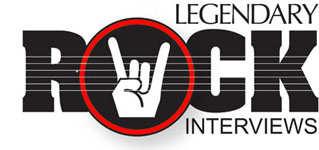
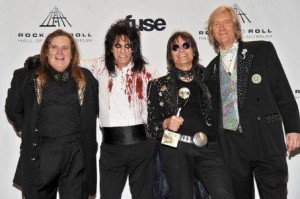
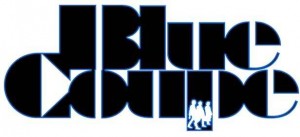
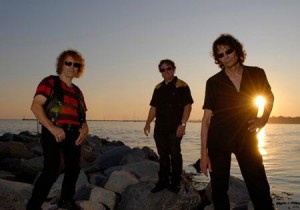
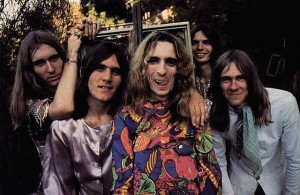
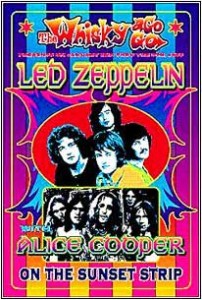
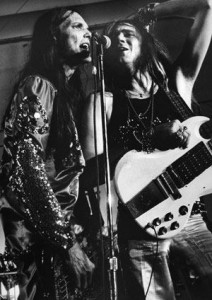
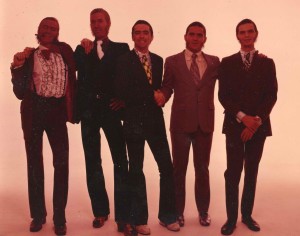
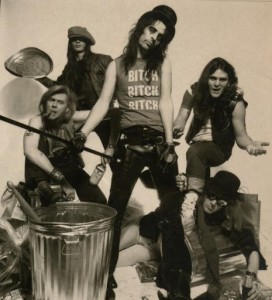
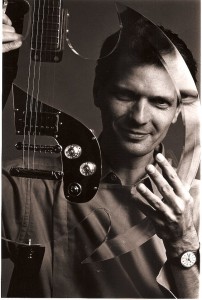
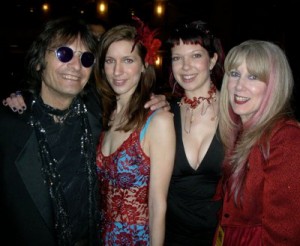



Always a pleasure to read a or hear a Dennis interview. Dennis is the gentleman in the music business.
Nick Woodburn
Dennis still is a pepper Hot Bass player and top man. So Dennis please come to the U.K and play. How about a Michael Bruce interview?.
It’s all still Aerosmith circa 1978 to me.